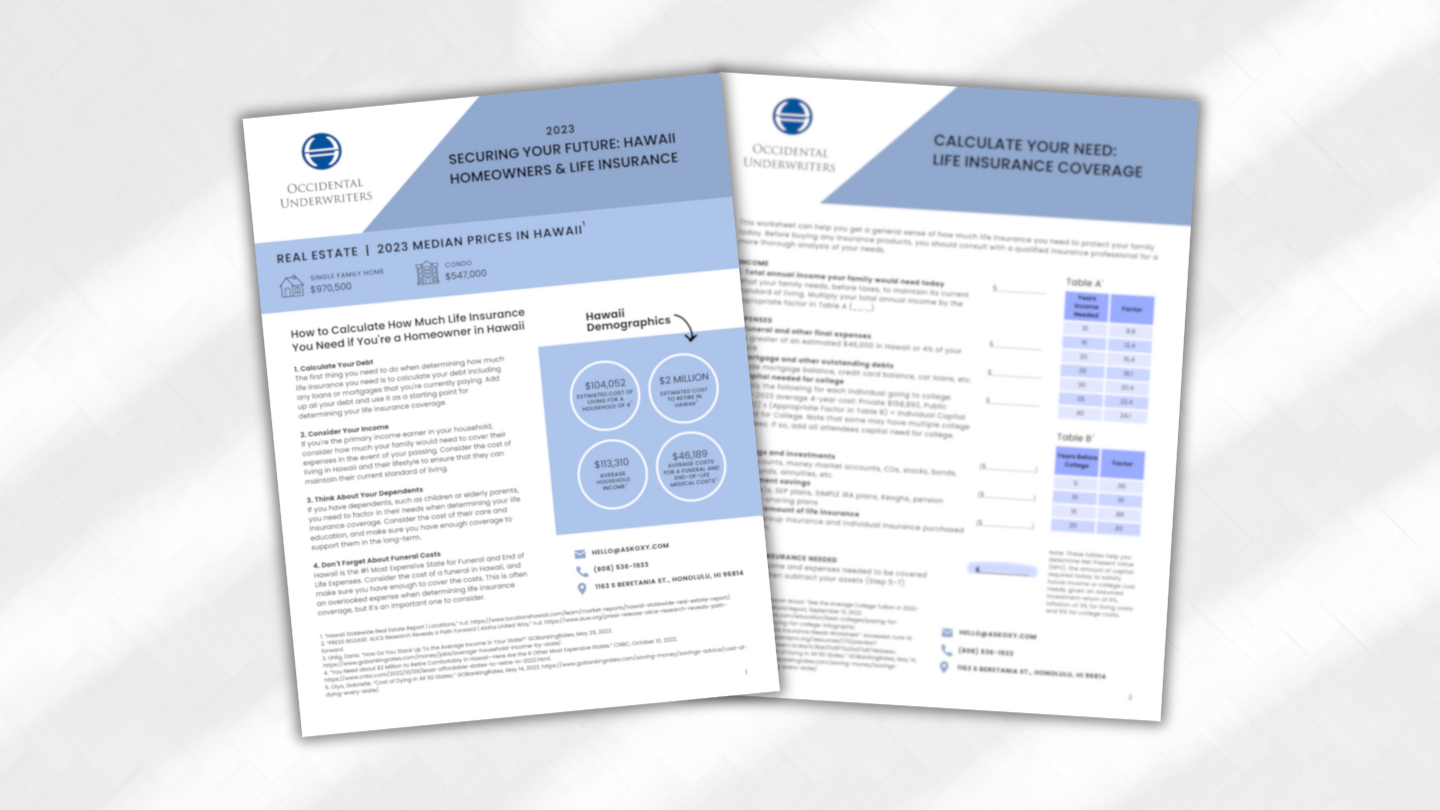Life Insurance
Your family is your legacy.
Life insurance protects their future.
Life insurance gives you, your family and your loved ones the financial support to continue living while coping with the loss of a loved one. Everyone needs life insurance.
Life Insurance Rates: Comparing Health Classes
Preferred Best Health Class
| Age | Coverage Amount | 20 Yr Term Life (Monthly) | Indexed Universal Life (Monthly) |
|---|---|---|---|
| 30 | $250,000 $500,000 $1,000,000 |
$10.86 $15.89 23.49 |
$71.00 $116.58 $207.67 |
| 40 | $250,000 $500,000 $1,000,000 |
$15.14 $24.00 $40.53 |
$100.92 $176.33 $327.25 |
| 50 | $250,000 $500,000 $1,000,000 |
$30.41 54.52 95.48 |
$166.58 $307.92 $590.42 |
| 60 | $250,000 $500,000 $1,000,000 |
$73.79 $140.51 $264.09 |
$270.25 $515.42 $1,005.75 |
Standard Health Class
| Age | Coverage Amount | 20 Yr Term Life (Monthly) | Indexed Universal Life (Monthly) |
|---|---|---|---|
| 30 | $250,000 $500,000 $1,000,000 |
$17.59 $28.67 $47.56 |
$88.33 $151.17 $276.92 |
| 40 | $250,000 $500,000 $1,000,000 |
$24.64 $42.70 $77.55 |
$127.92 $230.42 $435.42 |
| 50 | $250,000 $500,000 $1,000,000 |
$51.79 $96.93 $180.67 |
$217.42 $409.42 $793.50 |
| 60 | $250,000 $500,000 $1,000,000 |
$131.89 $257.13 $471.58 |
$355.83 $686.42 $1,347.67 |
Lowest annual rates for each age and risk class are displayed. Other ages are available, i.e. 34 years old. Data valid as of June 14, 2023. Term Life Quotes, “Life Insurance,” June 14, 2023. https://www.askoxy.com/life/. IUL Protection, $1 CSV at age 121, full pay, illustrated rate at 6%.
Preferred Best Health Class
The preferred best health class is the most favorable rating category for life insurance applicants, offering the lowest premiums and favorable underwriting terms. To qualify, applicants must be in excellent overall health, be non-smokers, have a clean medical history, and avoid high-risk hobbies or occupations. Insurance companies evaluate individual factors to determine the appropriate health class, and it is advisable to consult with an insurance professional for precise information based on specific circumstances.
VS.
Standard Health Class
The standard health class in life insurance represents average health and carries moderate premiums. Individuals in this class typically have minor health issues or lifestyle factors that slightly increase their risk compared to those in preferred classes. To qualify, applicants should generally be in good health, with manageable chronic conditions or minor surgeries in their medical history, and may be non-smokers or occasional tobacco users.
Table of Contents
How Life Insurance Works
Life insurance pays out benefits when a policyholder dies. It can help cover debts and final expenses like funeral costs, pay off a mortgage or even provide for children who are still young. Whether you’re about to get married, planning for retirement or just looking for peace of mind, life insurance is one of the most important things you can own.
Reasons to Consider Life Insurance
Types of Life Insurance
Summary
- Life insurance policies come in different forms for specific financial needs.
- Common types of life insurance are term life insurance, whole life insurance, universal life insurance, and variable life insurance.
- Term insurance covers a specific period and has lower premiums, making it ideal for those who need coverage for a limited time.
- Permanent insurance provides coverage for life and has higher premiums, allowing you to build cash value over time.
- The type of life insurance chosen depends on financial goals, budget, and personal circumstances.
Life insurance policies come in various forms, each designed to meet specific financial needs and objectives. The most common types of life insurance policies include term life insurance, whole life insurance, universal life insurance, and variable life insurance.
Term Insurance
Term insurance provides coverage for a specific period, usually ranging from 10 to 30 years. It has lower premiums compared to permanent insurance and is ideal for those who want guaranteed coverage for a limited time period.
Many consider term insurance for important life events such as a new mortgage (30-year term policy), a new child (20-year term policy), and to cover debt. However, it lacks a cash value component and may not provide lifetime protection.
VS.
Permanent Insurance
Permanent life insurance, which includes whole, universal, and variable life insurance, offers potential coverage for life, a cash value component, and potential investment opportunities.
This type of policy is ideal for individuals looking for long-term financial security, estate planning, or wealth accumulation. However, it comes with higher premiums, which may not be suitable for everyone.
Making an Informed Decision: Understanding the Influence of Life Insurance Carriers
When it comes to securing life insurance, choosing the right carrier is a critical step in protecting your financial future and ensuring the well-being of your loved ones. With numerous life insurance carriers available in the market, understanding their influence and the factors to consider is essential for making an informed decision. We evaluate insurance carriers based on their:
-
Reputation and Financial Stability: One of the key factors to consider when selecting a life insurance carrier is their reputation and financial stability. A reputable carrier with a strong financial standing ensures that your policy will be honored, and claims will be paid out promptly. Look for carriers that have high ratings from independent rating agencies such as A.M. Best, Standard & Poor’s, or Moody’s.
-
Product Offerings and Customization: Different life insurance carriers offer a variety of products and coverage options. Take the time to understand the types of policies available, such as term life insurance, whole life insurance, or universal life insurance. Consider the flexibility and customization options offered by the carrier to tailor your coverage to meet your specific needs and financial goals.
-
Underwriting Guidelines and Policy Approval: Life insurance carriers have their own underwriting guidelines that determine the criteria for policy approval and premium rates. It’s important to understand these guidelines as they can vary among carriers. Factors such as your age, health condition, occupation, and lifestyle choices may affect your eligibility for coverage and the cost of your premiums. Working with an experienced insurance advisor can help you navigate the underwriting process and find the carrier that best aligns with your circumstances.
-
Customer Service and Claims Process: Consider the level of customer service provided by the life insurance carrier. Research their customer reviews and ratings to gain insights into their responsiveness, support, and claims settlement process. A carrier with a reputation for excellent customer service can provide peace of mind and a smoother experience should you need to file a claim.
-
Additional Benefits and Riders: Life insurance carriers may offer additional benefits and policy riders that can enhance your coverage. Common riders include accelerated death benefit riders, which allow policyholders to access a portion of the death benefit in the event of a terminal illness diagnosis, and waiver of premium riders, which waive premium payments if you become disabled. Understanding these options and their associated costs can help you make an informed decision.
Our Insurance Company Partners
We’re partnered with 20+ A rated carriers to provide the best options.

Steps to Life Insurance

Determine How Much Coverage You Need
Use this calculator to approximate how much life insurance coverage you need based on your income, expenses, and family goals. It will give you a good estimate to keep in mind for when you contact our team.

Determine the Duration
How long would you like insurance coverage for?
There are many different life insurance products that can keep you covered for a period of years or for the rest of your life. Knowing why you want life insurance is important in determining the duration of your policy needs. A 20-year Term Life policy could protect your family until your kids are out of school where a Universal Life policy will guarantee an inheritance for your loved ones while giving you more flexibility in retirement.

Compare and Apply
We’ll send you a list of solutions and find the best fit for you.
We have been proudly serving the families of Hawaii for nearly 90 years. We look forward to helping you find the policy that gives you peace of mind while providing your family a lifeline far into the future.



















